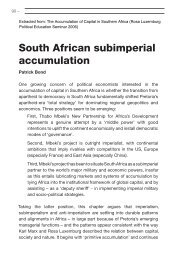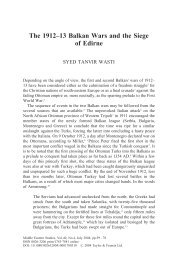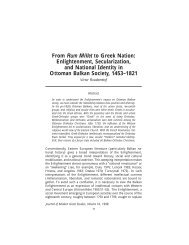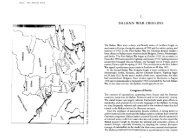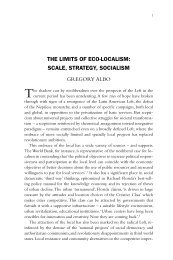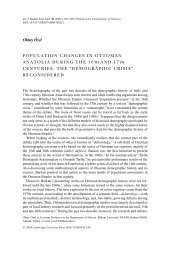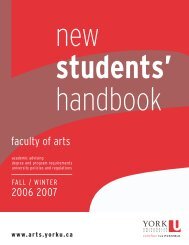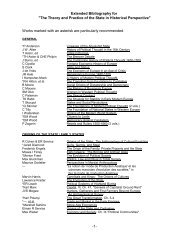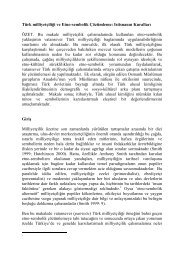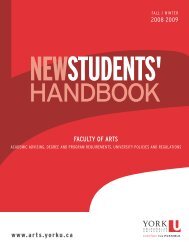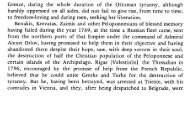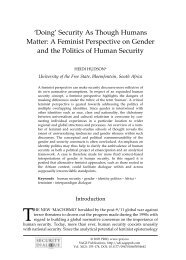FYCSG 05/06 REV2 - Faculty of Arts - York University
FYCSG 05/06 REV2 - Faculty of Arts - York University
FYCSG 05/06 REV2 - Faculty of Arts - York University
Create successful ePaper yourself
Turn your PDF publications into a flip-book with our unique Google optimized e-Paper software.
SUGGESTED COURSE SELECTION FOR FIRST YEAR.<br />
(ASSUMES A COURSE LOAD OF 30 CREDITS):<br />
• 1000-level 9 credit Foundations HUMA or SOSC course;<br />
• 6 credit 1000-level EN course;<br />
• 1000-level 6 credit NATS course;<br />
• 6 credit elective course or 6 credit 2000-level EN course;<br />
• 3 credit elective course (optional).<br />
English and Pr<strong>of</strong>essional Writing<br />
This Specialized Honours Program brings together the literary studies and analysis <strong>of</strong><br />
English with the advanced language and writing skills <strong>of</strong> Pr<strong>of</strong>essional Writing.<br />
Note: Students may complete a maximum <strong>of</strong> 6 credits from the 2200 series <strong>of</strong> AS/EN<br />
courses for major credit in English and Pr<strong>of</strong>essional Writing.<br />
SUGGESTED COURSE SELECTION FOR FIRST YEAR.<br />
(ASSUMES A COURSE LOAD OF 30 CREDITS):<br />
• AS/EN/HUMA/WRIT1980 9.0 (will fulfill Foundations requirement);<br />
• 6 credit 1000-level EN course;<br />
• 6 credit elective course or AS/EN2070 6.0, AS/EN2910 6.0, or 6 credit 2000-level<br />
EN course;<br />
• 1000-level 6 credit NATS course;<br />
• 3 credit elective course (optional) or AS/WRIT2300 3.0.<br />
European Studies<br />
Events in Europe itself over the last decade have brought the region ever more into<br />
the public eye and established its importance for Canada: the ongoing unification <strong>of</strong><br />
Europe in the European Union; the collapse <strong>of</strong> Communism and the consequent problems<br />
<strong>of</strong> transition; the crisis in the Balkans; even our “fish war” with Spain in 1995. The<br />
program in European Studies allows students to develop their interests in Europe, which<br />
we define as broadly as possible, to include Eastern and Central Europe, the Balkans,<br />
Southeastern Europe, Russia and Turkey, as well as Western Europe, by choosing from<br />
among a wide variety <strong>of</strong> courses from a number <strong>of</strong> departments and divisions. In consultation<br />
with the Program Coordinator/ Advisor, students will be able to design a coherent<br />
set <strong>of</strong> courses which meets their own particular interests. As an Honours (Double Major)<br />
Program, European Studies permits students to apply their knowledge <strong>of</strong> a specific discipline<br />
to the study <strong>of</strong> Europe. European Studies may also be taken as a Minor combined<br />
with another major subject.<br />
Students considering European Studies as a major should take the core course,<br />
AS/HUMA2195 9.0 Defining Europe: Introduction to European Studies, early in their<br />
program. *(Note: 6 credits <strong>of</strong> this course will count towards the European Studies major.)<br />
They should also take an introductory course in one or two <strong>of</strong> the departments which<br />
<strong>of</strong>fer courses with European content. Students must also satisfy a language requirement.<br />
They may do this in one <strong>of</strong> two ways: by completing 6 credits in a European<br />
language (other than English) or by passing an approved competency test in a European<br />
language (other than English).<br />
SUGGESTED COURSE SELECTION FOR FIRST YEAR.<br />
(ASSUMES A COURSE LOAD OF 30 CREDITS):<br />
• 1000-level 9 credit Foundations SOSC course;<br />
• Introductory course towards Major 1 (usually 6 credits);<br />
• 6 credit language course, or AS/HIST1010 6.0, or AS/HIST1<strong>05</strong>0 6.0;<br />
• 1000-level 6 credit NATS course;<br />
• 3 credit elective course (optional).<br />
French Studies<br />
The Department <strong>of</strong> French Studies <strong>of</strong>fers courses which allow students to pursue interests<br />
in French language, linguistics and literature, as well as courses for non-majors.<br />
The language skills courses listed in Section 1 below form a prescribed Language<br />
sequence designed to help students improve their pr<strong>of</strong>iciency in French. The courses listed<br />
in Section 2 are for non-Majors/Minors in French Studies.<br />
For students who wish to take French Studies courses as electives, the Department<br />
<strong>of</strong>fers three Certificates <strong>of</strong> Pr<strong>of</strong>iciency in French Language (Beginner, Intermediate, and<br />
Advanced) which can be completed while fulfilling the requirements <strong>of</strong> a degree. More<br />
information is available at www.arts.yorku.ca/french.<br />
A language placement questionnaire is required <strong>of</strong> all students prior to enrolling for<br />
the first time in the Department <strong>of</strong> French Studies. Failure to complete a placement<br />
questionnaire will result in denial <strong>of</strong> enrolment access to the course, and/or de-enrolment<br />
from the course.<br />
In order to proceed from one level <strong>of</strong> French Studies to the next (the four levels being<br />
1000, 2000, 3000, and 4000), a student must obtain a minimum grade <strong>of</strong> C in each<br />
course taken within the Language Sequence Courses. Language Sequence courses are:<br />
AS/FR1080 6.0, AS/FR2081 3.0, AS/FR2082 3.0, AS/FR3080 6.0, AS/FR3081 3.0,<br />
AS/FR3082 3.0, and AS/FR3180 6.0.<br />
1. LANGUAGE SEQUENCE<br />
AS/FR1080 6.0 Language and Culture in the French Speaking World. An intensive<br />
course designed to improve the student’s ability to speak, understand, read and write<br />
French. Guided and free conversation, grammar review, compositions, readings in<br />
French and French-Canadian literature. Three class hours, plus lab sessions.<br />
Prerequisite: AS/FR1030 6.0 (with a minimum grade <strong>of</strong> C) or through language placement<br />
testing.<br />
Degree credit exclusions: AS/FR1<strong>06</strong>0 6.0, AS/FR1180 6.0.<br />
Language <strong>of</strong> instruction: French.<br />
2. COURSES FOR NON-MAJORS/MINORS<br />
AS/FR1020 6.0 Elementary French: Near Beginners. This course is designed for<br />
students who have not studied French or who do not have sufficient French to be<br />
admitted to AS/FR1030 6.0. The course involves the development <strong>of</strong> oral and written<br />
skills. Grammar and reading are also emphasized. Four class hours, and lab sessions.<br />
Note: This course is not a major/minor course for French Studies.<br />
AS/FR1030 6.0 Intermediate French. This course is for students who have studied or<br />
had some contact with French, but not enough to enter AS/FR1080 6.0. The aim <strong>of</strong> the<br />
course is to review, consolidate and develop oral and written skills. Special emphasis<br />
will be placed on grammar. Four class hours, and lab sessions.<br />
Prerequisite: AS/FR1010 6.0 or AS/FR1020 6.0 or placement questionnaire.<br />
Note: This course is not a major/minor course for French Studies.<br />
SUGGESTED COURSE SELECTION FOR FIRST YEAR.<br />
(ASSUMES A COURSE LOAD OF 30 CREDITS):<br />
• 1000-level 9 credit Foundations HUMA or SOSC course;<br />
• 6 credit FR language course (as determined by placement questionnaire);<br />
• 1000-level 6 credit NATS course;<br />
• 6 credit elective course;<br />
• 3 credit elective course (optional).<br />
Geography<br />
Geography is concerned with the spatial variations <strong>of</strong> human and physical phenomena,<br />
the processes which produce these variations, and the interrelationships between<br />
people and their environments. The Department <strong>of</strong>fers courses dealing with Canada,<br />
Asia, and the Caribbean Islands that explore the transformation <strong>of</strong> these areas, as well<br />
as their past and present geography. There are also courses relating to urban, economic,<br />
social, cultural, historical, and physical geography. Combined with these <strong>of</strong>ferings are<br />
specialties such as those dealing with water resources and resource management,<br />
third world development, regional planning, ecological studies, landforms, arctic<br />
climates, and environments.<br />
10




